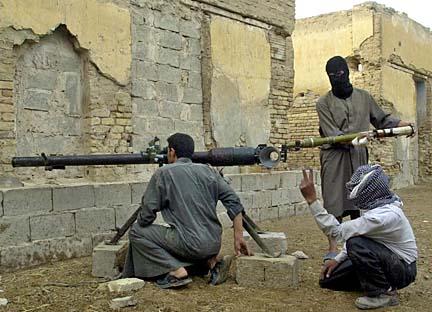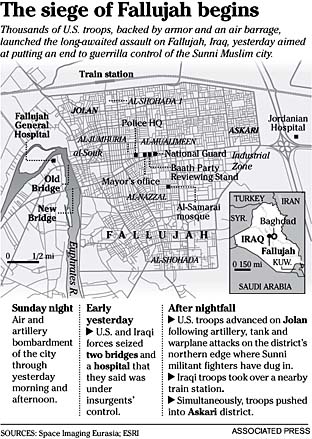

|
Slow, bitter fight
erupts as forces
enter Fallujah
Marines from Kaneohe face
a notoriously ruthless foe
and a pervasive array
of explosive booby traps
FALLUJAH, IRAQ » U.S. forces launched an all-out assault on Fallujah last night that U.S. and Iraqi officials hope will turn the tide against Iraq's ferocious insurgency.
But the fight -- which could bring the most extensive urban combat by U.S. Marines and Army units since Vietnam --- promises to be tough.
Once darkness fell around the blacked-out city, Operation Phantom Fury got under way. U.S. forces laid down a smoke wall in the city's northeast sector to provide cover for advancing troops. Artillery and tracer rounds lit up the sky as vehicles advanced with the aid of infrared strobe lights, visible only with night-vision goggles.
The assaulting forces expect an array of booby traps, car bombs and explosives -- all of them asymmetric threats -- designed by insurgents to take a lethal toll.
"They're seeing wires strung up between houses -- even the first houses," says Sgt. Kevin Boyd, chief scout of the 1st Light Armored Reconnaissance Company, after hearing the news on his helmet radio set. "They are not (car bombs). They are house bombs."
"This is not going to be easy," replied Cpl. Christopher DeBlanc, a scout team leader of Raider Platoon, from Spotsylvania, Va.
"No, it's not," agreed Boyd, from Pittsburgh.
For the main assault, the Monitor has been embedded with Raider One, a rare Marine armored vehicle configuration of six scouts, a Navy medical corpsman, a vehicle commander, his deputy and a driver.
The LAR company is attached to the Kaneohe-based 1st Battalion, 3rd Marines, one of six battalions that make up the Fallujah invasion force. The Marines expect to face ruthlessness from an insurgency notorious for hostage-taking, videotaped murders and frequent indiscriminate suicide attacks against civilians.
The Marines also expect to deliver ruthlessness in return, though they have been drilled repeatedly on rules of engagement that require strict separation of fighters from civilians.

Insurgents prepared to fire a recoilless rifle yesterday during a counterattack on U.S. forces in Fallujah, Iraq.
Feels like 'Christmas Eve'
They call their vehicle "Trojan Horse"; the scouts' call sign is "Death Dealers." As they rolled into battle yesterday, they strung up an olive-drab cravat showing skull and crossbones, superimposed upon a wooden cross."You know what this feels like? Christmas Eve," says Lance Cpl. Matt McClellan, a light machine gunner from Clayton, N.J., with a wry wit. "You wait for it all December, and you know it's coming up."
These Marines are young, mostly in their early 20s, and carry pictures in their helmets and cargo pants of girlfriends or new wives. This company is experienced and took part in the invasion of Iraq last year.
"Game Day" yesterday began with rainfall at 2 a.m.
"Of course, it has to rain before we attack," groaned Lance Cpl. Cody Williams, the Raider One driver from Chandler, Ariz., as he balled up his sleeping bag and strapped it to his pack.
"Now we know it's real," said Williams, wistfully. "We're wet and miserable."
As dawn broke, the company slipped into points on the north side of town.
Carrying an earthquake
Raider One carried enough demolition explosives, if all detonated at once, to produce a detectable seismic event. The quantity elicited jokes every time someone lit a cigarette.There was also concern that all the rain was seeping into the explosive store. But Boyd assured his comrades it was tucked in his pack, safe and dry.
"If this is going to be my last day, I want one of these before I go," said DeBlanc, picking up a packet of French Vanilla Cappuccino mix and grabbing a small carton of milk pilfered from the dining hall.
Just after mixing it in a tin canteen, Raider One revved up and charged closer to the city limits. DeBlanc, standing in the open back with the other scouts, barely kept the cappuccino from spilling.
He then took a long draught, and passed it around until it was drained.
"Whew!" he said. "Back in the fight."
www.mcbh.usmc.mil/3mar/1dbn/1-3%20INDEX.htm
Marine Corps Base Hawaii
www.mcbh.usmc.mil
Rockets, rifle and
mortar rounds greet
U.S. and Iraqi advance
sFALLUJAH, Iraq » Thousands of U.S. Marines and soldiers swarmed over a railroad embankment on the northern edge of Fallujah last night and early today, setting off a wild firefight and making their first advances across the deadly streets and twisting alleyways of this rebel-held city.
Most of the 6,500 U.S. troops and 2,000 Iraqi soldiers went over the embankment at six separate points, military officials said, aiming to clear the city of insurgents one house at a time and eventually take several large public buildings in the heart of the city.
A U.S. military spokesman estimated that 42 insurgents were killed across the city in bombardment and skirmishes before the main assault began yesterday. Two Marines were killed when their bulldozer flipped over into the Euphrates near Fallujah.

"They'll try to pull us into the city," said Col. Craig Tucker, a Marine who was in charge of a major unit called a regimental combat team. "They'll win if it's bloody; we'll win if we minimize civilian casualties."
Hundreds or thousands of insurgents met the U.S. attack, sometimes contesting every inch of the advance and sometimes melting back into the darkened houses of the city they have held for more than six months.
Fire from rockets, mortars and assault rifles would lash out at the Americans from seemingly deserted buildings until heavy return fire destroyed them one by one, leaving only smoking ruins. Then the firing would start from another direction.
The number of insurgents in the city is estimated at 3,000, although some guerrillas, terrorist fighters and their leaders escaped the city before the attack. U.S. military officials estimated that out of a usual population of 300,000, from 70 to 90 percent of civilians had fled.
Just before the Marines began to push south into Fallujah, the U.S. bombardment intensified, and heavy artillery could be heard pounding positions in or near the city every few minutes. An entire apartment complex was ground to rubble. A train station was obliterated in a hail of 2,000-pound bombs. All electrical power in the city was cut off at about 5 p.m.
By 1 a.m. today, U.S. troops assigned to northeastern neighborhoods had advanced the farthest in the operation -- about 800 yards into the city, military officials said. But some of the units further to the west, under heavy fire and picking their way through abandoned vehicles, rubble and barbed wire, took hours to advance past a single line of houses.
Later in the morning, other units continued to advance closer to the center of the city. Seven members of the invading force were reported wounded: Four were hurt when their vehicle flipped over, and three more when a mortar shell landed near them.
U.S. commanders have avoided any public estimate on how long it might take to capture Fallujah, where insurgents fought the Marines to a standstill last April in a three-week siege.
The length and ferocity of the battle depends greatly on whether the bulk of the defenders decide to risk the destruction of the city or try to slip away in the face of overwhelming force. Foreign fighters might choose to fight to the end, but it is unclear how many of them are in the city.